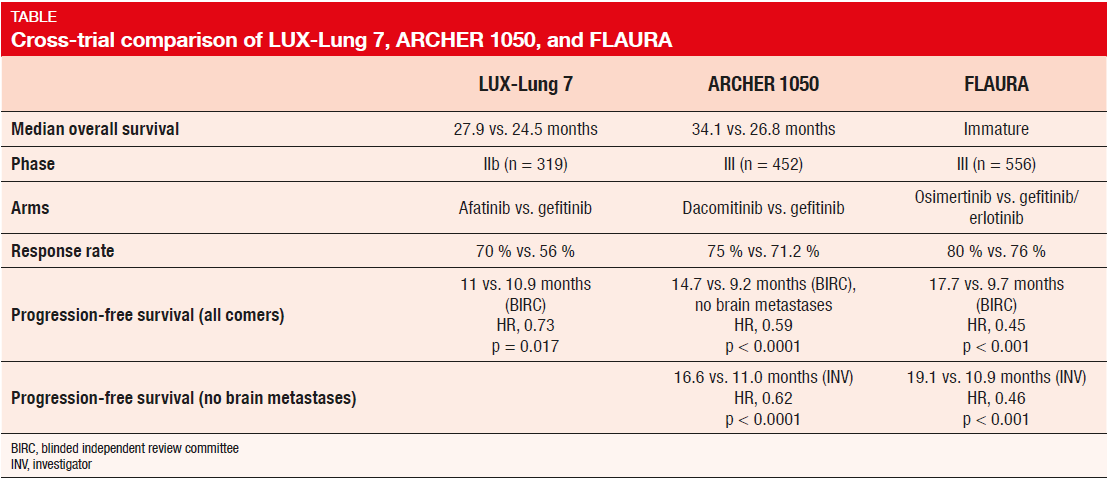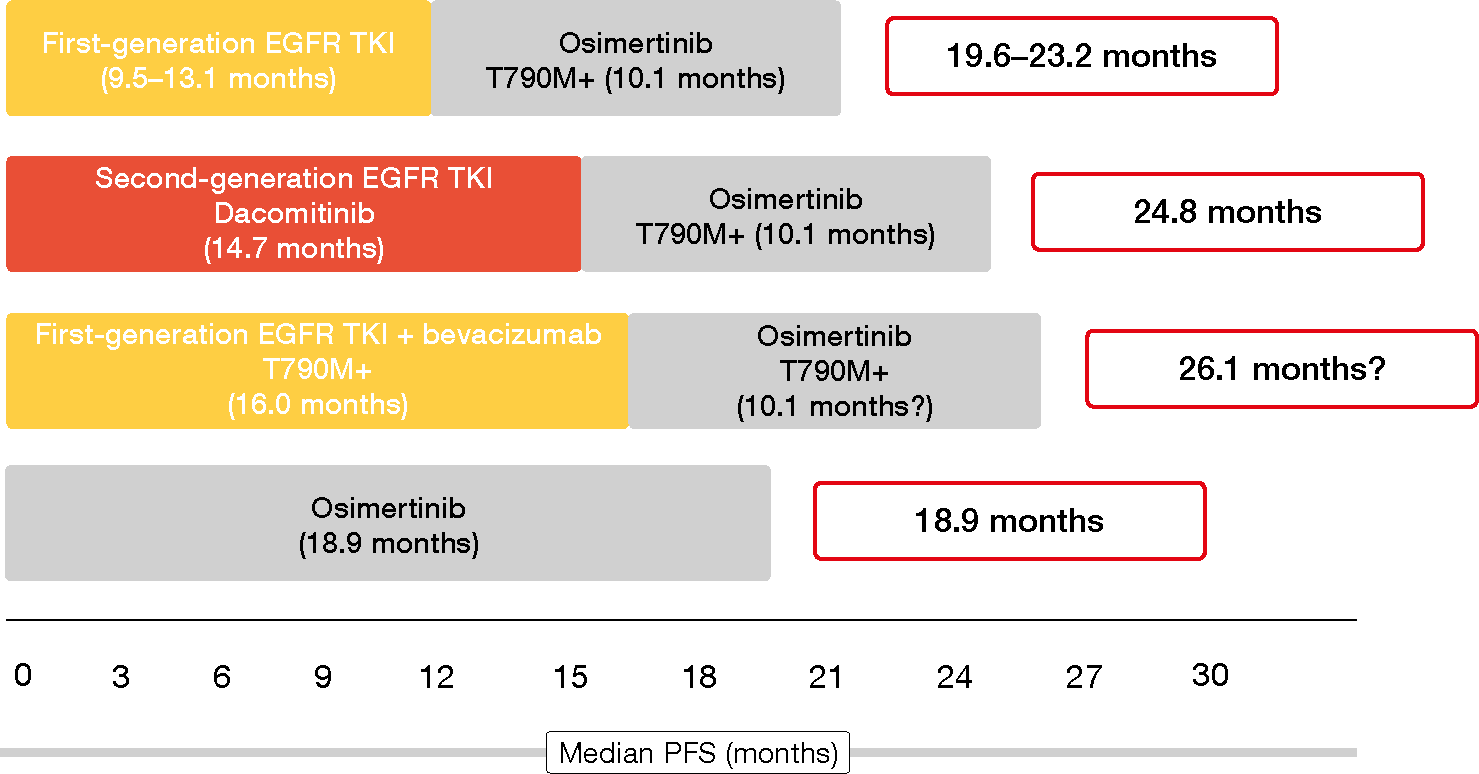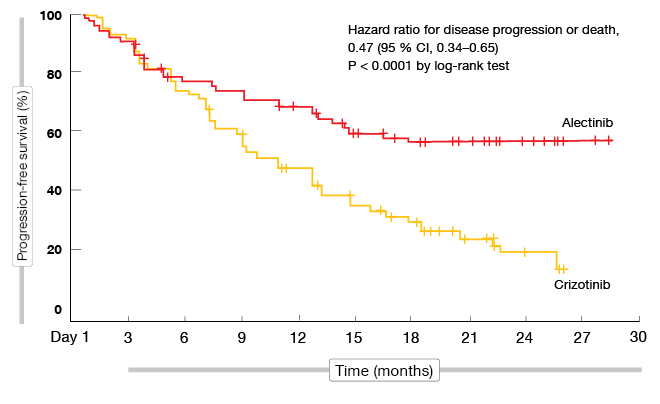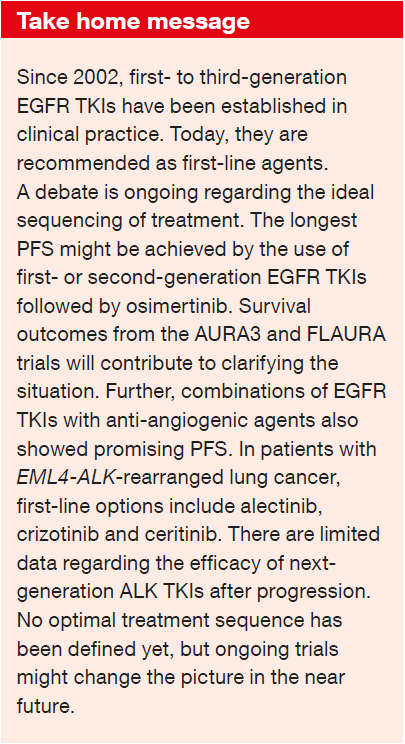EGFR- and ALK-targeted treatment: present and future
Chemotherapy for advanced or metastatic lung carcinoma has evolved slowly with limited progress between 1948 and the beginning of the 21st century. Until then, only minimal gains in long-term OS had been achieved, and the benefit of chemotherapy was discussed in a controversial manner. Fortunately, this was the very time when the rise of molecularly targeted agents started. Amazing progress has occurred during the past two decades. Today, a multitude of agents is available for the treatment of patients with oncogene-driven lung cancer.
EGFR TKI treatment
The beginning: gefitinib & erlotinib
Drugs targeting activating EGFR mutations include erlotinib, gefitinib, afatinib, dacomitinib, icotinib, osimertinib, and nazartinib. Phase II data published in 2002 were the first to demonstrate that gefitinib, administered as a once-daily oral pill, elicits substantial responses after failure of chemotherapy [12, 13]. In 2003, gefitinib received accelerated approval by the U.S. Food and Drug Administration (FDA) as monotherapy after failure of both platinum-based and docetaxel chemotherapies. In 2004, Lynch et al. found that activating mutations in the epidermal growth factor receptor underlie the responsiveness of NSCLC to gefitinib [14]. This marks the beginning of precision oncology in solid tumors.
However, it took several years for TKI treatment to enter the NCCN Practice Guidelines for the first-line management of NSCLC, until after the IPASS trial was reported in 2009. In this Asian study, 1,217 untreated patients were randomized to either gefinitib or carboplatin plus paclitaxel [15]. The trial population contained two groups, one with EGFR mutations and one without. In the EGFR-mutant group, gefitinib was significantly superior to chemotherapy with regard to PFS (HR, 0.48; p < 0.001). On the other hand, those without EGFR mutation fared significantly better when treated with chemotherapy (HR, 2.85; p < 0.001).
From 2010, four randomized first-line trials assessed gefitinib and erlotinib in the first-line setting in EGFR-mutation–selected patients. The OPTIMAL study yielded an unprecedented risk reduction for PFS with erlotinib compared to chemotherapy (HR, 0.16; p < 0.0001) [16]. In 2013, the NCCN guidelines (version 2.2013) provided gefitinib and erlotinib with a category-1 recommendation for the first-line treatment of EGFR-positive NSCLC.
Second-generation agents afatinib and dacomitinib
Afatinib was the first second-generation EGFR TKI to enter the stage. In the LUX-Lung 3 and 6 trials, first-line afatinib was compared to cytotoxic chemotherapy [17, 18]. Both trials revealed PFS improvement, establishing afatinib as a first-line option equal to erlotinib and gefitinib with a category-1 recommendation according to the NCCN guidelines (version 3.2014). Notably, patients with brain metastases also derived significant PFS benefit from afatinib, according to combined analyses from LUX-Lung 3 and 6 (HR, 0.50; p = 0.03) [19]. Median time to CNS progression was longer with afatinib than with chemotherapy for both patients with or without baseline brain metastases.
The LUX-Lung 7 trial demonstrated that first- and second-generation EGFR TKIs are not equal [20]. In this head-to-head study, afatinib gave rise to significant improvements in PFS and response rate compared to gefitinib (Table). Likewise, the second-generation agent dacomitinib improved PFS over gefitinib in the ARCHER 1050 trial (14.7 vs. 9.2 months; HR, 0.59; p < 0.0001 according to blinded independent review; Table), although patients with brain metastases were excluded from this study [21].
Osimertinib: AURA3 & FLAURA
Initial responses to EGFR TKI treatment are often dramatic, but resistance emerges over time, leading to recurrence. In half of the cases, the secondary EGFR T790M mutation underlies acquired resistance. The third-generation EGFR TKI osimertinib has been designed to target this mutation. Patients progressing after first-line EGFR TKI therapy who had documented T790M mutation participated in the phase III AURA3 trial that compared osimertinib with platinum-based chemotherapy [22]. Stable asymptomatic CNS metastases were allowed.
PFS by investigator assessment was defined as the primary endpoint. Osimertinib proved superior to chemotherapy here, with a risk reduction of 70 % (PFS 10.1 vs. 4.4 months; HR 0.30, p < 0.001). Overcoming T790M mutation is another meaningful step in lung cancer treatment. Also, according to a subset analysis, patients with brain metastases experienced encouraging activity of osimertinib [23]. The CNS overall response rates were 70 % and 31 % for osimertinib and chemotherapy, respectively (p = 0.015). Seven patients with CNS lesions had leptomeningeal metastases at baseline; four of these experienced CR or PR with osimertinib treatment, and three had stable disease. Consistent with these encouraging data, the NCCN guidelines (version 4.2017) recommended the use of osimertinib for patients with T790M mutation and both asymptomatic and symptomatic progression.
The FLAURA trial tested osimertinib as a first-line treatment option in patients with common EGFR mutations [24]. Patients in the control arm received gefitinib or erlotinib. The protocol permitted stable CNS metastases. PFS by investigator assessment constituted the primary endpoint and was significantly in favor of the osimertinib treatment (18.9 vs. 10.2 months; HR, 0.46; p < 0.001). Blinded independent central review yielded comparable PFS results (17.7 vs. 9.7 months; Table). Accordingly, the NCCN guidelines (version 9.2017) included osimertinib as a first-line option along with gefitinib, erlotinib and afatinib.
The issue of first-line treatment selection
Given this wealth of choice, the individual treatment decision can be difficult. An indirect comparison of the LUX-Lung 7, ARCHER 1050 and FLAURA trials reveals some differences between the studies (Table). It is arguable that the comparator was suboptimal in FLAURA, which employed gefitinib and erlotinib in the control arm. The data obtained in two other studies, the JO25567 and NEJ026 trials, show that the addition of bevacizumab to erlotinib markedly improves PFS over erlotinib monotherapy (JO25567: 16.4 vs. 9.8 months; HR, 0.52; p = 0.0005; NEJ026: 16.9 vs. 13.3 months; HR, 0.605; p = 0.0157), raising the median outcomes to the levels observed in ARCHER 1050 and FLAURA [25, 26].
Also, the question of sequencing remains, as salvage options should be available after the failure of first-line treatment. In their review, Ferrara et al. noted that the longest PFS could be achieved by sequencing first- or second-generation EGFR TKIs with osimertinib, rather than by using osimertinib upfront (Figure 3) [27]. There are currently no established options after osimertinib failure, apart from cyctotoxic chemotherapy. It remains to be seen how sequencing of TKIs compares to osimertinib with or without subsequent chemotherapy.
Survival may be the best surrogate marker to answer the question of treatment selection. However, OS data from AURA3 and FLAURA are not mature yet, and data from other trials tend to be confusing. So far, the only head-to-head trial to yield a survival benefit was ARCHER 1050 (34.1 vs. 26.8 months with dacomitinib and gefitinib, respectively; HR, 0.76; p = 0.0438) [28]. The JO 25567 study showed no difference with respect to OS between erlotinib plus bevacizumab and erlotinib alone. In NEJ009, a trial comparing gefitinib plus chemotherapy with gefitinib monotherapy, patients in the combination arm experienced improved OS (52.2 vs. 38.8 months; HR, 0.695; p = 0.013) [29]. According to a post-hoc analysis of LUX-Lung 7, approximately one fifth of patients who discontinued afatinib or gefitinib subsequently received third-generation EGFR TKIs including osimertinib, olmutinib, and rociletinib [30]. Here, OS rates at 3 years exceeded 80 % in both arms, and median OS had not been reached with afatinib (vs. 48.3 months with gefitinib; HR, 0.49).
For the time being, first-line treatment selection is still under debate, and positioning of osimertinib has to be agreed upon. The phase II EORTC 1613 trial is trying to find an answer by comparing osimertinib until progression with the sequence of gefinitib followed by osimertinib.
Figure 3: Sequential treatment strategies and cumulative progression-free survival with first- and next-generation EGFR TKIs
Lung cancer with EML4-ALK rearrangement
Crizotinib: long-term standard
The first-generation ALK TKI crizotinib received approval in 2011 and was the only targeted first-line option in patients with advanced EML4-ALK–rearranged NSCLC for several years. The initial trial showed an overall response rate of 57 %, and at 6 months, 72 % of patients were progression-free [31]. Further evidence was provided by the phase III PROFILE 1007 and PROFILE 1014 studies that successfully compared crizotinib to chemotherapy in the second- and first-line settings, respectively [32, 33].
Ceritinib and alectinib
However, as for anti-EGFR therapy, resistance invariably develops, which calls for effective later-line treatment options. CNS failure constitutes a notorious pattern of relapse in lung cancer patients with EML4-ALK rearrangement.
The second-generation ALK TKI ceritinib demonstrated pronounced anti-tumor activity in the phase I ASCEND-1 trial that recruited both ALK-inhibitor-naïve and -pretreated patients [34]. In 2014, ceritinib was recommended by the NCCN guidelines (version 4.2014) after crizotinib failure. Three years later, ceritinib received a category-1 recommendation for the first-line treatment of ALK-positive NSCLC (version 6.2017) based on the ASCEND-4 study, which compared ceritinib with chemotherapy in untreated patients [35]. PFS in the experimental arm by blinded independent review was more than twice as long as PFS obtained with chemotherapy (16.6 vs. 8.1 months; HR, 0.55; p < 0.00001).
Likewise, impressive results have been observed with the second-generation ALK TKI alectinib. This treatment elicited an objective response rate of 55 % in the phase I/II setting and showed CNS activity even in heavily pretreated patients [36]. Based on these data as well as on the phase II NP28673 and NP28761 trials that confirmed the robust efficacy of alectinib [37], FDA approval after crizotinib failure was granted in 2015. Finally, the global phase III ALEX study established alectinib as a first-line agent [38]. Compared to crizotinib, it gave rise to an impressive PFS improvement (not reached vs. 11.1 months; HR, 0.47, p < 0.001; Figure 4) and again showed excellent activity in patients with brain lesions. Eighty-one percent of those with measurable CNS metastases at baseline responded on the CNS level (vs. 50 % with crizotinib). The NCCN guidelines (version 7.2017) recommended alectinib as the preferred first-line option.
Treatment sequence: times of change
After failure of first-line alectinib, crizotinib or ceritinib, subsequent use of ceritinib, alectinib or brigatinib can be considered. Brigatinib has shown substantial responses in the phase II ALTA study in heavily pretreated patients progressing on crizotinib [39]. Later-line options still need to be established.
To date, no ideal sequence of ALK TKI therapy has been identified in prospective clinical trials. First-line alectinib appears to be the best treatment, as it outperforms other TKIs including sequential regimens with regard to PFS [27]. However, results from three first-line studies testing next-generation ALK TKIs (brigatinib, lorlatinib, ensartinib) need to be awaited. Pre-clinical and clinical trials are required to determine the best combination regimens to delay or prevent resistance to ALK TKI therapy.
Figure 4: Investigator-assessed progression-free survival in the ALEX trial (crizotinib versus alectinib)
REFERENCES
- Fukuoka M et al., Multi-institutional randomized phase II trial of gefitinib for previously treated patients with advanced non-small-cell lung cancer (the IDEAL 1 Trial) [corrected]. J Clin Oncol 2003; 21: 2237-2246
- Kris MG et al., Efficacy of gefitinib, an inhibitor of the epidermal growth factor receptor tyrosine kinase, in symptomatic patients with non-small cell lung cancer: a randomized trial. JAMA 2003; 290(16): 2149-2158
- Lynch TJ et al., Activating mutations in the epidermal growth factor receptor underlying responsiveness of non-small-cell lung cancer to gefitinib. N Engl J Med 2004; 350(21): 2129-2139
- Mok TS et al., Gefitinib or carboplatin-paclitaxel in pulmonary adenocarcinoma. N Engl J Med 2009; 361: 947-957
- Zhou C et al., Erlotinib versus chemotherapy as first-line treatment for patients with advanced EGFR mutation-positive non-small-cell lung cancer (OPTIMAL, CTONG-0802): a multicentre, open-label, randomised, phase 3 study. Lancet Oncol 2011; 12: 735-421
- Sequist LV et al., Phase III study of afatinib or cisplatin plus pemetrexed in patients with metastatic lung adenocarcinoma with EGFR mutations. J Clin Oncol 2013; 31(27): 3327-3334
- Wu YL et al., Afatinib versus cisplatin plus gemcitabine for first-line treatment of Asian patients with advanced non-small-cell lung cancer harbouring EGFR mutations (LUX-Lung 6): an open-label, randomised phase 3 trial. Lancet Oncol 2014; 15(2): 213-222
- Schuler M et al., First-line afatinib versus chemotherapy in patients with non-small cell lung cancer and common epidermal growth factor receptor gene mutations and brain metastases. J Thorac Oncol 2016; 11(3): 380-390
- Park K et al., Afatinib versus gefitinib as first-line treatment of patients with EGFR mutation-positive non-small-cell lung cancer (LUX-Lung 7): a phase 2B, open-label, randomised controlled trial. Lancet Oncol 2016; 17(5): 577-589
- Mok T et al., Dacomitinib versus gefitinib for the first-line treatment of advanced EGFR mutation positive non-small cell lung cancer (ARCHER 1050): A randomized, open-label phase III trial. J Clin Oncol 35, 2017 (suppl; abstr LBA9007)
- Mok TS et al., Osimertinib or platinum-pemetrexed in EGFR T790M-positive lung cancer. N Engl J Med 2017; 376(7): 629-640
- Mok TS et al., CNS response to osimertinib in patients (pts) with T790M-positive advanced NSCLC: Data from a randomized phase III trial (AURA3). J Clin Oncol 35, 2017 (suppl; abstr 9005)
- Soria J-C et al., Osimertinib in untreated EGFR-mutated advanced non-small-cell lung cancer. N Engl J Med 2018; 378: 113-125
- Yamamoto N et al., Erlotinib plus bevacizumab (EB) versus erlotinib alone (E) as first-line treatment for advanced EGFR-mutation–positive non-squamous non–small-cell lung cancer (NSCLC): Survival follow-up results of JO25567. J Clin Oncol 36, 2018 (suppl; abstr 9007)
- Furuya N et al., Phase III study comparing bevacizumab plus erlotinib to erlotinib in patients with untreated NSCLC harboring activating EGFR mutations: NEJ026. J Clin Oncol 36, 2018 (suppl; abstr 9006)
- Ferrara R et al., Progress in the management of advanced thoracic malignancies in 2017. J Thorac Oncol 2018; 13(3): 301-322
- Mok T et al., Dacomitinib (daco) versus gefitinib (gef) for first-line treatment of advanced NSCLC (ARCHER 1050): Final overall survival (OS) analysis. J Clin Oncol 36, 2018 (suppl; abstr 9004)
- Nakamura A et al., Phase III study comparing gefitinib monotherapy (G) to combination therapy with gefitinib, carboplatin, and pemetrexed (GCP) for untreated patients (pts) with advanced non-small cell lung cancer (NSCLC) with EGFR mutations (NEJ009). J Clin Oncol 36, 2018 (suppl; abstr 9005)
- Corral J et al., Afatinib (A) vs gefitinib (G) in patients with EGFR mutation-positive (EGFRm+) NSCLC: Updated OS data from the phase IIb trial LUX-Lung 7 (LL7). Ann Oncol 2017; 28 (suppl_2): ii28-ii51
- Kwak EL et al., Anaplastic lymphoma kinase inhibition in non-small-cell lung cancer. N Engl J Med 2010; 363(18): 1693-1703
- Shaw AT et al., Crizotinib versus chemotherapy in advanced ALK-positive lung cancer. N Engl J Med 2013; 368: 2385-2394
- Solomon BJ et al., First-line crizotinib versus chemotherapy in ALK-positive lung cancer. N Engl J Med 2014; 371(23): 2167-2177
- Kim DW et al., Activity and safety of ceritinib in patients with ALK-rearranged non-small-cell lung cancer (ASCEND-1): updated results from the multicentre, open-label, phase 1 trial. Lancet Oncol 2016; 17(4): 452-463
- Soria JC et al., First-line ceritinib versus platinum-based chemotherapy in advanced ALK-rearranged non-small-cell lung cancer (ASCEND-4): a randomised, open-label, phase 3 study. Lancet 2017; 389(10072): 917-929
- Gadgeel SM et al., Safety and activity of alectinib against systemic disease and brain metastases in patients with crizotinib-resistant ALK-rearranged non-small-cell lung cancer (AF-002JG): results from the dose-finding portion of a phase 1/2 study. Lancet Oncol 2014; 15(10): 1119-28
- Yang JC et al., Pooled systemic efficacy and safety data from the pivotal phase II studies (NP28673 and NP28761) of alectinib in ALK-positive non-small cell lung cancer. J Thorac Oncol 2017; 12(10): 1552-1560
- Peters S et al., Alectinib versus crizotinib in untreated ALK-positive non–small-cell lung cancer. N Engl J Med 2017; 377: 829-838
- Kim DW et al., Brigatinib in patients with crizotinib-refractory anaplastic lymphoma kinase-positive non-small-cell lung cancer: A randomized, multicenter phase II trial. J Clin Oncol 2017; 35(22): 2490-2498








